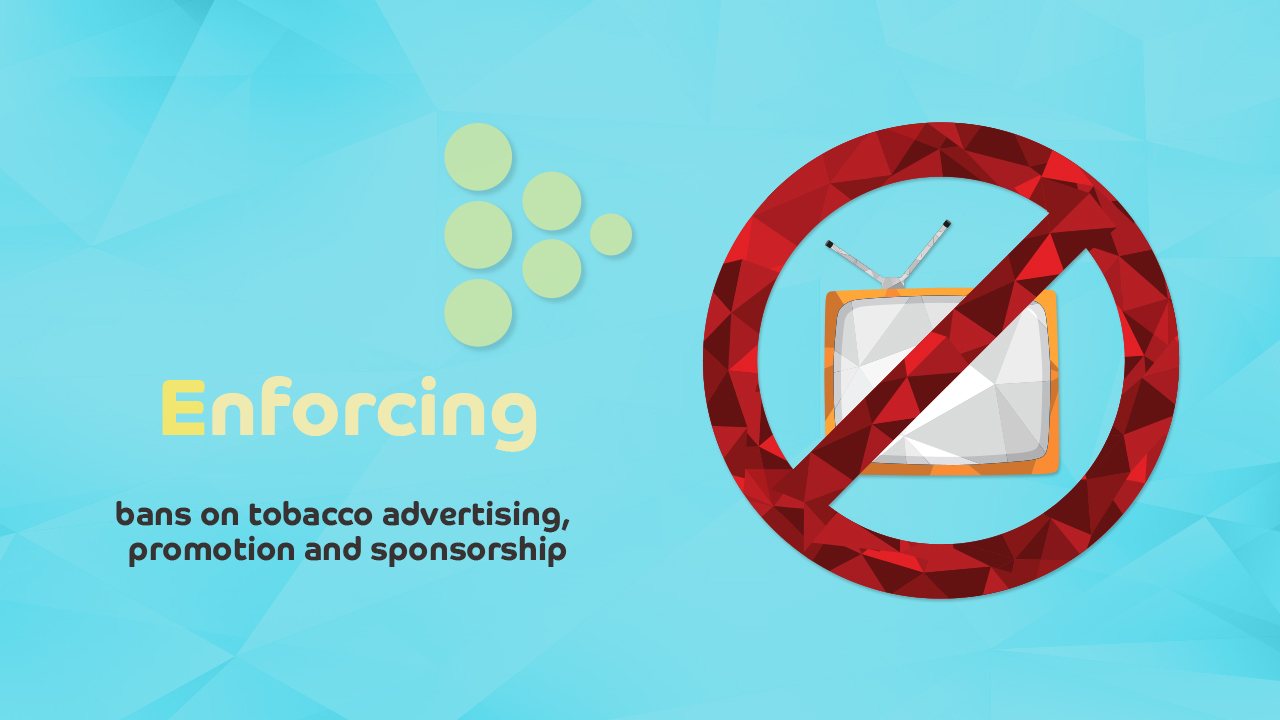
Context
Oman became a Party to the WHO Framework Convention on Tobacco Control (FCTC) in 2005, the second country of the Gulf Cooperation Council and 5th in the WHO Eastern Mediterranean Region to do so. Until 2013, collaboration among the National Tobacco Control Committee, including the Ministry of Information, Ministry of Commerce and Industry, and local municipalities, led to an unofficial prohibition on tobacco product advertising across various media platforms such as billboards, national newspapers, private and public radio, and national television broadcasts. This was achieved by denying permits for such commercial activities, which all media companies in Oman strictly adhered to. However, this informal ban did not cover point-of-sale advertisements and those found on individual tobacco packs. Furthermore, Oman lacked national legislation to completely ban tobacco advertising, promotion and sponsorship.
Initiative
In 2013, Oman took action to comply with Article 13 of the WHO FCTC by implementing a comprehensive ban on tobacco promotion. This included prohibiting discounts, giveaways, draws and scratch cards associated with tobacco products, as well as banning tobacco advertising, including point-of-sale advertisements. The National Coordination Mechanism actively advocated for these requirements in the National Tobacco Control Committee meetings and ensured their implementation. Two committee members, representing the Ministry of Commerce and Industry, introduced amendments to the products promotion regulations through Ministerial Decree No. 239 in December 2013, which explicitly banned all direct and indirect forms of tobacco product promotion. The decree clearly defined various forms of promotion and included punitive measures.
In 2015, another committee member successfully obtained Ministerial Decree No. 129 for 2015, which prohibited all direct and indirect discounts and sales on tobacco products. In 2016, the committee member from the Ministry of Information played a crucial role in issuing Ministerial Decree No. 42 for 2016, which banned all forms of tobacco advertising, including electronic media. However, the tobacco industry, through its retailers, resisted implementing the ban at points-of-sale, arguing that the ministerial ban only applied to published print media and television advertisements. To address this, the Ministry of Information amended Ministerial Decree No. 43 for 2018 to explicitly state a ban on all forms of advertising, wherever they are found. This settled the matter, resulting in the complete disappearance of tobacco product advertising, including at points-of-sale, throughout Oman.
Challenges and lessons learnt
Successful tobacco control efforts require concerted multisectoral collaboration and coordination. The ban on direct and indirect tobacco product advertising and promotion was communicated to all municipalities. However, achieving a comprehensive ban on tobacco advertising and promotion took Oman five years and required careful consideration of potential loopholes exploited by the tobacco industry, including its retailers. Continuous monitoring and follow-up by the National Coordination Mechanism are crucial for maintaining momentum in tobacco control. Despite these achievements, challenges remain. Cross-border tobacco advertising is a concern due to the accessibility of international media beyond national jurisdiction. Further legislative work is needed to address sponsorship and corporate social responsibility activities, which are currently restricted through mutual understanding between the National Tobacco Control Committee and targeted institutions.
Impact
The specific impact of the ban on tobacco advertising and promotion in Oman has not been measured. As the latest Global Youth Tobacco Survey was conducted in 2016, further research is required to assess whether these bans have resulted in a decrease in the proportion of young people who visit points-of-sale and are exposed to tobacco advertising or promotions (34.5%), own items with cigarette brand logos (9.2%), or have received free cigarettes from tobacco company representatives (7.1%). However, compliance data collected in the country indicate that the bans on direct and indirect tobacco advertising are effectively enforced, with a high level of compliance (7 to 8 out of 10), according to the WHO Report on the Global Tobacco Epidemic of 2019. Currently, all forms of tobacco advertising, promotion and discounts have been eliminated throughout Oman. This is expected to contribute to a reduction in tobacco use among both adults and youth, fulfilling Oman's obligations under the WHO FCTC.
Next steps
It is important to establish a mechanism that ensures the ongoing enforcement of these tobacco control measures, as well as any future initiatives. Similar strategies employed for implementing excise taxes on tobacco products and introducing pictorial health warnings in Oman and other countries of the Gulf Cooperation Council should be utilized.
References
MPOWER measures to reduce demand for tobacco
WHO Framework Convention on Tobacco Control
WHO Report on the Global Tobacco Epidemic 2019
Story originated in 2019.




